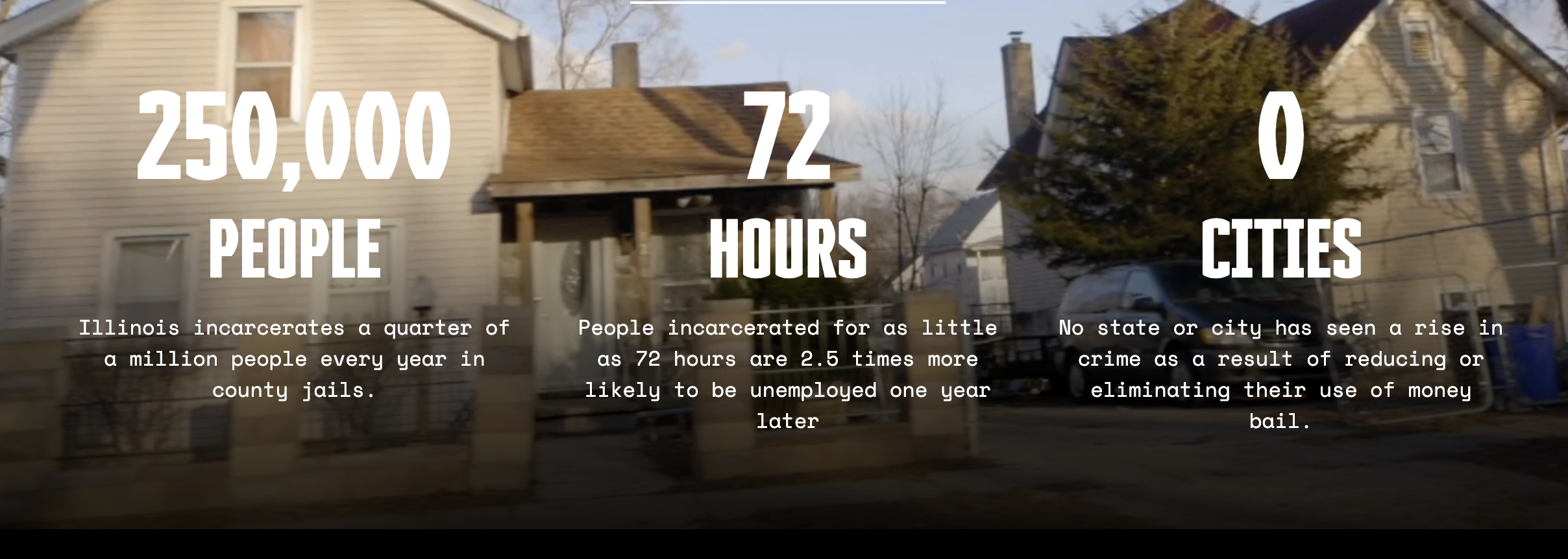“Money bond is ransom!” That’s what community members plastered on posters in protest as they advocated for a world where people’s freedom didn’t depend on their bank account balance. The assumption that those who can afford an arbitrarily assigned bond amount are less likely to be guilty is absurd. The assumption that pretrial incarceration determined by who can afford their freedom keeps us safe is a lie. The idea that someone is less dangerous because they can afford a money bond is a lie. The practice invalidates the presumption of innocence and is therefore unconstitutional. This understanding is what caused organizers to build the case against the use of money bond in Illinois, and it worked. As a result of the passage of the Pretrial Fairness Act, bail bond will be obsolete across the state by January 2023.
The vast majority of people incarcerated in jails, sometimes up to 90%, haven’t been convicted of a crime. For example, in Harris County Jail out of the 10,000 residents at least 7,500 of them haven’t been convicted. That majority is incarcerated simply because of their inability to afford bond or even a delayed court date. Those incarcerated on a Friday after hours, wouldn’t even have the opportunity to post bond until administration offices open on Monday, forcing the individual to spend the weekend in jail. Even more absurdly, people often find themselves incarcerated for exercising their right to a fair trial, rather than accepting a plea deal. As another example, in Illinois the largest jail in the country, Cook County Jail, spans across 8 city blocks with a population of over 5,000 people with 90% of its residents incarcerated without any conviction. The ongoing exploitation of impoverished people served as evidence of a broken system that advocates refused to allow to persist.
While the problem has been evident for decades, it’s the task of reimagining how the jail system functions that is the real work. Like a child struggling to imagine owning their own business rather than being an employee, it can be difficult to dream beyond what an individual has been exposed to. Advocates, organizers, legal professionals, policy analysts and impacted people themselves collaborated in order to collectively dream up the functions of a world without a cost to freedom for those facing jail time. Litigators designing policy around this issue were able to identify specific release rates for specific types of crimes in order to develop guiding expectations These guidelines force judges and prison staff to restrict the use of unaffordable cash bond to rare circumstances if any. Even more significantly, if release rates aren’t meeting the above guidelines, it would trigger a thorough investigation of the violating court by a third party community partner with the authority to access all files, staff, judges, and courtrooms in order to develop a report that includes binding recommendations that the Court must follow in order to be in compliance with the new law. This method of reimagining new tactics to implement within a broken system through communal conversations that allow us to dream collectively is one that we can apply to all arenas of “criminal justice reform” or otherwise dismantling of the prison industrial slave complex.
How do we create spaces to dream together? How do we collectively imagine, especially for those isolated from the collective by bars? Contrary to popular belief, sharing physical space is not required in order to form a collective. Whether you realize it or not, as a reader of this newsletter you’re operating within a collective community, albeit passively. The Right2Vote’s readers are a community facilitated through a print medium. As an individual, your existence is at the intersection of many communities: family, educational peers, work colleagues and even recreational groups are all communities that are capable of dreaming together. I challenge you to dream with other like-minded people, dream beyond a world without money bond. Envision a world without jails, a society that refuses to rely on a carceral system, prisons or police. When we refuse to dream, we prevent ourselves from seeking out new tactics for problem solving. When we refuse to dream with others we limit ourselves to our own experiences and worldview. Dreaming with others expands the landscape of possibilities that we can discover. Once those discoveries are made, then we’re able to pivot to policy drafting, legislative advocacy and finally implementation of new laws that reframe the way our world looks and functions, but that all starts with the courage to hold space to collectively dream. Check out the exclusive interview with one of those leading dreamers, Briana Payton, Policy Analyst with the Chicago Community Bond Fund in the development of this legislation below
A Few Key Accomplishments of the Pretrial Fairness Act Include
- Limits Eligibility for Pretrial Incarceration: The Pretrial Fairness Act allows only people accused of qualifying charges to be detained pretrial, and they can only be jailed if a judge finds they pose a high risk of willful flight or a specific threat to someone else.
- Regulates Risk Assessment Tools: The Pretrial Fairness Act ensures that risk assessment tools cannot be the sole basis for pretrial incarceration. It requires information about the scoring systems used to be given to accused people and their defense attorneys and allows defense attorneys to challenge the validity of a risk assessment tool used in court.
- Authorizes Release by Law Enforcement: The Pretrial Fairness Act avoids unnecessary pretrial jailing by requiring police to give some people tickets without arresting them and authorizing police to release others who have been arrested with court dates in cases where there is no risk to public safety.
- Reduces Penalties for Violations of Pretrial Release Conditions: Technical violations of pretrial release (such as missing a court date) and misdemeanor arrests will no longer result in people indefinitely losing their pretrial freedom. Violations of pretrial release conditions will also be downgraded from possible felonies to Class A misdemeanors.
Fine more at www.endmoneybond.org/pretrialfairness

